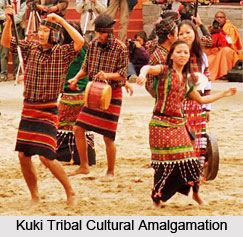 Village administration of Kuki tribe represents a traditional social structure which revolves around a chief, deputy chief and council of ministers that bear the authority of administration. While the Upa is primarily responsible for the rules and regulations of the land he runs the administration with the help of his council of ministers. Along with the Upa and Naopa, the village administration includes the Priest, Blacksmith and the Village Labour Corps who play significant role in the village life of Kuki tribes.
Village administration of Kuki tribe represents a traditional social structure which revolves around a chief, deputy chief and council of ministers that bear the authority of administration. While the Upa is primarily responsible for the rules and regulations of the land he runs the administration with the help of his council of ministers. Along with the Upa and Naopa, the village administration includes the Priest, Blacksmith and the Village Labour Corps who play significant role in the village life of Kuki tribes.
Village administration of Kuki tribe mainly revolves round the office of Chieftan which is also known as Haosa. This office is primarily responsible for running the daily administration of the village; provides security to the village people while protecting their economic interest. Basically the village administration includes administration of justice, enforcement of executive function, maintenance of social practices and customary laws including the religious performances. These are the basic responsibilities of the chief or the Upa of the tribe in which he is assisted by the Naopa or the secretary as well as the council of ministers. Along with these another very important person is the village priest or the Thiempu who is responsible for both religious practices as well as public health. In a literary sense a Thiempu is a person who shall have complete knowledge not only regarding the rituals and religious practices of the soil but also regarding medicines which requires complete knowledge about the secrets of medicine. The Theimpu is one of the most important persons of a Kuki tribe who shall attend to all the villagers at times of sickness and shall perform all the social rituals of the land. As such because of his knowledge and experience he is raised to such honours that sometimes he takes precedence over the Hoase. Overall the Thiempu along with the Upa and Naopa form the core of village administration of Kuki tribes.
Village administration of Kuki tribe also includes the Blacksmiths and the village labour corps who contribute in their way. A blacksmith is very important for agro based village communities as they manufacture all the equipments which are required for cultivation like the spades, hoes, axes etc. They are also responsible for manufacturing the weapons which are required for the personal security of the community. This includes weapons like swords, arrows, guns and bullets which are used by the tribal people of kuki community. For his services the blacksmith is offered a share of meat along with changseo which shall be lesser than the share of the Thiempu or Haosa. Overall the blacksmith too plays an important role in village administration. Along with a blacksmith the village labour corpse also play a significant role who is often known as Lawm shall be responsible for supervising the economic life of the villagers. The word Lawm literally refers to an informal labour organisation that is visible in the simple and corporate village life of the kuki tribes in which all the able girls and boys, men and women participate. There are four types of lawm organisations in the Kuki tribe which divides its members according to their age group.
Lawmpi
This includes the grown up boys and girls. This also includes the newly married boys who join the organisation till they find themselves unfit for participating in the Lawm. Lawm-Lai is the second type of Lawm organisation which includes the junior boys and girkls who are unmarried and whose brothers and sisters are members of lawmpi. Lawm-Neo is the third type of Lawm organisation that is formed by the third brothers and sisters of a family along with other teenagers. This followed by Lawm-Changpah which is the last type of Lawm organisation. This include those types of people whose services are not so much required in the house and should have some experience in cultivating the field. This is mainly a training group. Along with this the village administration also includes the group of Sawm who are a bachelor group of boys living in the dormitory. This group largely includes the able and fit bachelor boys.
Thus the village administration depends on these formal as well as informal groups for its local administration which add to the annual income of the Kuki tribe. The village administration in Kuki tribes also represents high judicial system which is largely seen in the rules for marriages. Overall this tribe has organised itself with separate legal and social system.
















